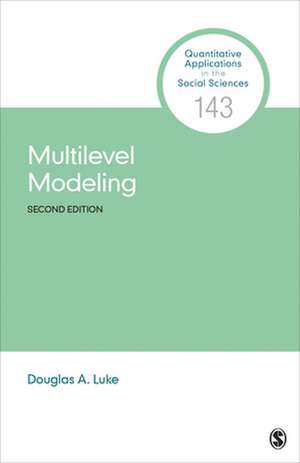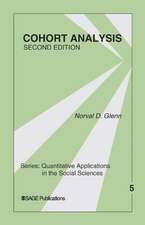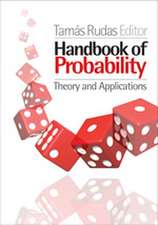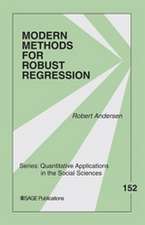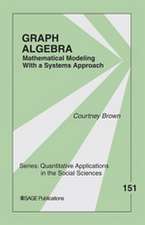Multilevel Modeling: Quantitative Applications in the Social Sciences, cartea 143
Autor Douglas A. Lukeen Limba Engleză Paperback – 6 mai 2020
Din seria Quantitative Applications in the Social Sciences
-
 Preț: 323.09 lei
Preț: 323.09 lei -
 Preț: 285.10 lei
Preț: 285.10 lei -
 Preț: 285.33 lei
Preț: 285.33 lei -
 Preț: 274.06 lei
Preț: 274.06 lei -
 Preț: 285.37 lei
Preț: 285.37 lei -
 Preț: 330.81 lei
Preț: 330.81 lei -
 Preț: 322.61 lei
Preț: 322.61 lei -
 Preț: 321.79 lei
Preț: 321.79 lei -
 Preț: 323.15 lei
Preț: 323.15 lei -
 Preț: 273.46 lei
Preț: 273.46 lei -
 Preț: 275.42 lei
Preț: 275.42 lei -
 Preț: 277.33 lei
Preț: 277.33 lei -
 Preț: 322.06 lei
Preț: 322.06 lei -
 Preț: 286.18 lei
Preț: 286.18 lei -
 Preț: 285.71 lei
Preț: 285.71 lei -
 Preț: 322.06 lei
Preț: 322.06 lei -
 Preț: 321.52 lei
Preț: 321.52 lei -
 Preț: 322.30 lei
Preț: 322.30 lei -
 Preț: 285.47 lei
Preț: 285.47 lei -
 Preț: 322.61 lei
Preț: 322.61 lei -
 Preț: 321.79 lei
Preț: 321.79 lei -
 Preț: 323.15 lei
Preț: 323.15 lei -
 Preț: 323.36 lei
Preț: 323.36 lei -
 Preț: 322.41 lei
Preț: 322.41 lei -
 Preț: 323.42 lei
Preț: 323.42 lei -
 Preț: 322.61 lei
Preț: 322.61 lei -
 Preț: 284.99 lei
Preț: 284.99 lei -
 Preț: 285.47 lei
Preț: 285.47 lei -
 Preț: 284.99 lei
Preț: 284.99 lei -
 Preț: 289.18 lei
Preț: 289.18 lei -
 Preț: 287.82 lei
Preț: 287.82 lei -
 Preț: 316.12 lei
Preț: 316.12 lei -
 Preț: 288.96 lei
Preț: 288.96 lei -
 Preț: 316.71 lei
Preț: 316.71 lei -
 Preț: 314.98 lei
Preț: 314.98 lei -
 Preț: 317.26 lei
Preț: 317.26 lei -
 Preț: 314.60 lei
Preț: 314.60 lei -
 Preț: 289.95 lei
Preț: 289.95 lei -
 Preț: 289.18 lei
Preț: 289.18 lei -
 Preț: 315.36 lei
Preț: 315.36 lei -
 Preț: 314.98 lei
Preț: 314.98 lei -
 Preț: 314.38 lei
Preț: 314.38 lei -
 Preț: 316.33 lei
Preț: 316.33 lei -
 Preț: 316.51 lei
Preț: 316.51 lei -
 Preț: 314.76 lei
Preț: 314.76 lei -
 Preț: 288.41 lei
Preț: 288.41 lei -
 Preț: 316.51 lei
Preț: 316.51 lei
Preț: 321.52 lei
Nou
Puncte Express: 482
Preț estimativ în valută:
61.53€ • 66.81$ • 51.69£
61.53€ • 66.81$ • 51.69£
Carte disponibilă
Livrare economică 01-15 aprilie
Livrare express 15-21 martie pentru 21.20 lei
Preluare comenzi: 021 569.72.76
Specificații
ISBN-13: 9781544310305
ISBN-10: 1544310307
Pagini: 128
Dimensiuni: 140 x 216 x 17 mm
Greutate: 0.14 kg
Ediția:Second Edition
Editura: SAGE Publications
Colecția Sage Publications, Inc
Seria Quantitative Applications in the Social Sciences
Locul publicării:Thousand Oaks, United States
ISBN-10: 1544310307
Pagini: 128
Dimensiuni: 140 x 216 x 17 mm
Greutate: 0.14 kg
Ediția:Second Edition
Editura: SAGE Publications
Colecția Sage Publications, Inc
Seria Quantitative Applications in the Social Sciences
Locul publicării:Thousand Oaks, United States
Recenzii
With growing statistical software package costs, more researchers are using R than ever before. This book allows researchers to do more when using R.
The book offers insights and explanations from which both newcomers and seasoned experts can find benefit.
Because of the author’s pedagogically masterful presentation of multi-level modeling, the otherwise challenging journey to this topic now becomes not only smooth but also enjoyable.
This is a very well-written and organized book. The author uses practical examples to help the readers understand the reasoning and steps of a complex statistical approach. I have used the first edition of this book in my class, and definitely plan on using the second edition too. This is a book that I would highly recommend to clinical researchers who are interested in learning multilevel modeling.
Multilevel Modeling provides a thorough and accessible introduction to multilevel models. Through extensive examples, the author expertly guides the reader through the material addressing interpretation, graphical presentation, and diagnostics along the way.
The new second edition is even better than the first. The models presented are closely linked to an extended example that students can readily identify with.
The book offers insights and explanations from which both newcomers and seasoned experts can find benefit.
Because of the author’s pedagogically masterful presentation of multi-level modeling, the otherwise challenging journey to this topic now becomes not only smooth but also enjoyable.
This is a very well-written and organized book. The author uses practical examples to help the readers understand the reasoning and steps of a complex statistical approach. I have used the first edition of this book in my class, and definitely plan on using the second edition too. This is a book that I would highly recommend to clinical researchers who are interested in learning multilevel modeling.
Multilevel Modeling provides a thorough and accessible introduction to multilevel models. Through extensive examples, the author expertly guides the reader through the material addressing interpretation, graphical presentation, and diagnostics along the way.
The new second edition is even better than the first. The models presented are closely linked to an extended example that students can readily identify with.
Cuprins
Series Editor's Introduction
About the Author
Preface
1. The Need for Multilevel Modeling
Background and Rationale
Theoretical Reasons for Multilevel Models
Statistical Reasons for Multilevel Models
Scope of Book
Online Book Resources
2. Planning a Multilevel Model
The Basic Two-Level Multilevel Model
The Importance of Random Effects
Classifying Multilevel Models
3. Building a Multilevel Model
Introduction to Tobacco Voting Data Set
Assessing the Need for a Multilevel Model
Model-building Strategies
Estimation
Level-2 Predictors and Cross-Level Interactions
Hypothesis Testing
4. Assessing a Multilevel Model
Assessing Model Fit and Performance
Estimating Posterior Means
Centering
Power Analysis
5. Extending the Basic Model
The Flexibility of the Mixed-Effects Model
Generalized Models
Three-level Models
Cross-classified Models
6. Longitudinal Models
Longitudinal Data as Hierarchical: Time Nested Within Person
Intra-individual Change
Inter-individual Change
Alternative Covariance Structures
7.Guidance
Recommendations for Presenting Results
Useful Resources
References
About the Author
Preface
1. The Need for Multilevel Modeling
Background and Rationale
Theoretical Reasons for Multilevel Models
Statistical Reasons for Multilevel Models
Scope of Book
Online Book Resources
2. Planning a Multilevel Model
The Basic Two-Level Multilevel Model
The Importance of Random Effects
Classifying Multilevel Models
3. Building a Multilevel Model
Introduction to Tobacco Voting Data Set
Assessing the Need for a Multilevel Model
Model-building Strategies
Estimation
Level-2 Predictors and Cross-Level Interactions
Hypothesis Testing
4. Assessing a Multilevel Model
Assessing Model Fit and Performance
Estimating Posterior Means
Centering
Power Analysis
5. Extending the Basic Model
The Flexibility of the Mixed-Effects Model
Generalized Models
Three-level Models
Cross-classified Models
6. Longitudinal Models
Longitudinal Data as Hierarchical: Time Nested Within Person
Intra-individual Change
Inter-individual Change
Alternative Covariance Structures
7.Guidance
Recommendations for Presenting Results
Useful Resources
References
Notă biografică
Douglas A. Luke is Professor and Director of the Center for Public Health Systems Science at the Brown School at Washington University in St. Louis. Dr. Luke is a leading researcher in the areas of public health policy, imple- mentation science, and systems science. Most of the work that Dr. Luke di- rects at the Center focuses on the evaluation, dissemination, and implemen- tation of evidence-based public health policies. During the past decade, Dr. Luke has worked on applying systems science methods to important public health problems, especially social network analysis. He has published two systems science review papers in the Annual Review of Public Health, and the first study to employ new statistical network modeling techniques on public health data was published in the American Journal of Public Health in 2010. He was also a member of a National Academy of Sciences panel that produced a recent report, Assessing the use of agent-based models for tobacco regulation, which provided the FDA and other public health scien- tists with guidance on how best to use computational models to inform to- bacco control regulation and policy. Dr. Luke directs the doctoral progam in Public Health Sciences at the Brown School, where he also teaches doctoral courses in multilevel and longitudinal modeling, social network analysis, and philosophy of social science. Dr. Luke received his Ph.D. in clinical and community psychology in 1990 from the University of Illinois at Urbana- Champaign
Descriere
Multilevel Modeling is a concise, practical guide to building models for multilevel and longitudinal data. Author Douglas A. Luke begins by providing a rationale for multilevel models; outlines the basic approach to estimating and evaluating a two-level model; discusses the major extensions to mixed-effects models; and provides advice for where to go for instruction in more advanced techniques. Rich with examples, the Second Edition expands coverage of longitudinal methods, diagnostic procedures, models of counts (Poisson), power analysis, cross-classified models, and adds a new section added on presenting modeling results. A website for the book includes the data and the statistical code (both R and Stata) used for all of the presented analyses.
